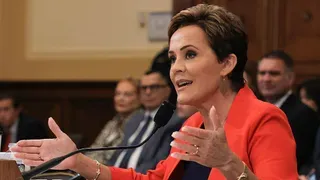September 13, 2011
Greece, Europe Struggle to Contain Debt Crisis
Kilian Melloy READ TIME: 2 MIN.
German Chancellor Angela Merkel sought to calm market fears that Greece is heading for a chaotic default on its debts as Europe struggles to contain a crippling financial crisis.
Her comments Tuesday come a day after her deputy raised the possibility of a default, and come ahead of another telephone discussion between Greece's finance minister and his German counterpart.
Fears of an imminent Greek default have pushed interest rates on the country's 10-year government bonds up further Tuesday to over 24 percent, even though Merkel sounded a note of optimism regarding Greece's chances of getting the next batch of bailout cash from the so-called troika - the European Commission, the European Central Bank and the International Monetary Fund.
Representatives from the three organizations are due back in Athens this week.
"Everything that I hear from Greece is that the Greek government has hopefully understood the signs of the time and is now doing the things that are on the daily agenda," Merkel said on rbb-Inforadio. "The fact that the troika is returning means that Greece has started doing some things that need to be done."
Merkel also warned of the perils of an "uncontrolled" Greek bankruptcy.
"I have said 'if the euro fails, Europe fails' - that that applies here and therefore everyone should very carefully weigh their words," she said. "What we don't need is unrest in the finance markets - the uncertainties are already big enough."
Greece is relying on international rescue loans to remain solvent. But lagging efforts to tame a bloated budget deficit and enforce reforms are now threatening that lifeline, which is conditional on fiscal progress.
Greece is trying to convince international creditors that it deserves to get the next tranche of money due from a bailout fund and the country's finance chief Evangelos Venizelos is to speak Tuesday with German finance minister Wolfgang Schaeuble. The two held a lengthy telephone conversation the previous day too.
The latest bout of jitters in the markets have been partly stoked by comments from Vice-Chancellor Philipp Roesler Monday that there should be "no bans on thinking" in how to resolve the euro crisis. By raising the specter of an "orderly insolvency," Roesler's comments reinforced concerns that Greece will end up defaulting.
Despite over 20 months of austerity and two international bailouts each worth about euro110 billion ($150 billion) - although the second faces considerable implementation delays - Greece's finances remain in a parlous state.
Over the past few days, Venizelos has issued a series of pledges to accelerate delayed reforms meant to cut the cost and size of the public sector, and raised the prospect of firing up to 20,000 public servants - which would break a major taboo in a country where state employees have guaranteed jobs for life.
In a last desperate bid to plug the revenue hole, the government on Sunday imposed a new, two-year blanket tax on property.
____
David Rising in Berlin contributed to this story.
Kilian Melloy serves as EDGE Media Network's Associate Arts Editor and Staff Contributor. His professional memberships include the National Lesbian & Gay Journalists Association, the Boston Online Film Critics Association, The Gay and Lesbian Entertainment Critics Association, and the Boston Theater Critics Association's Elliot Norton Awards Committee.







